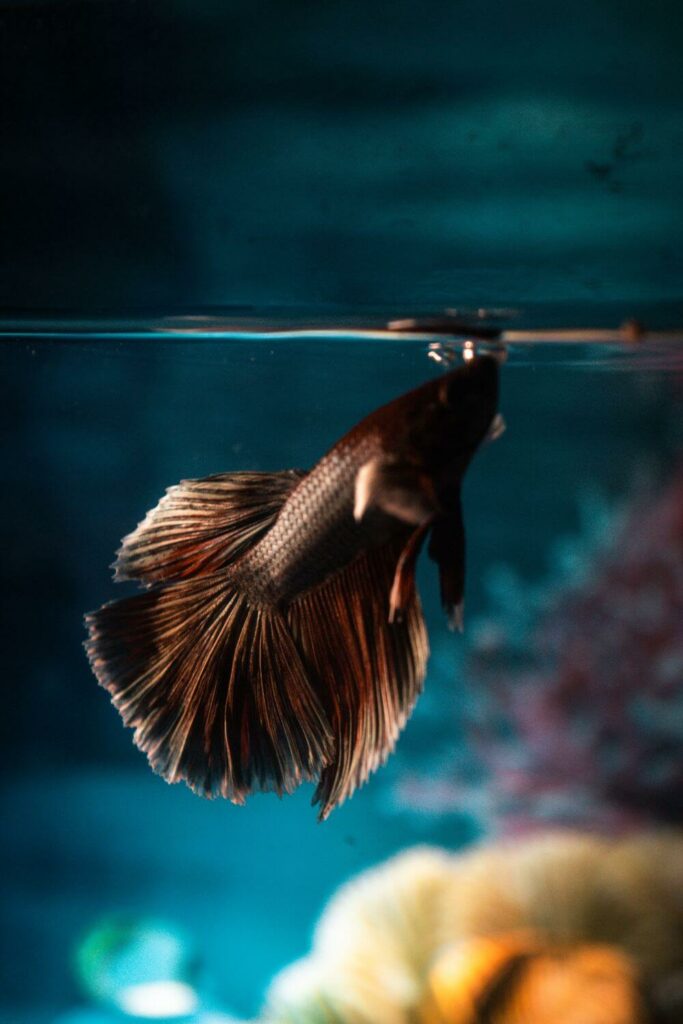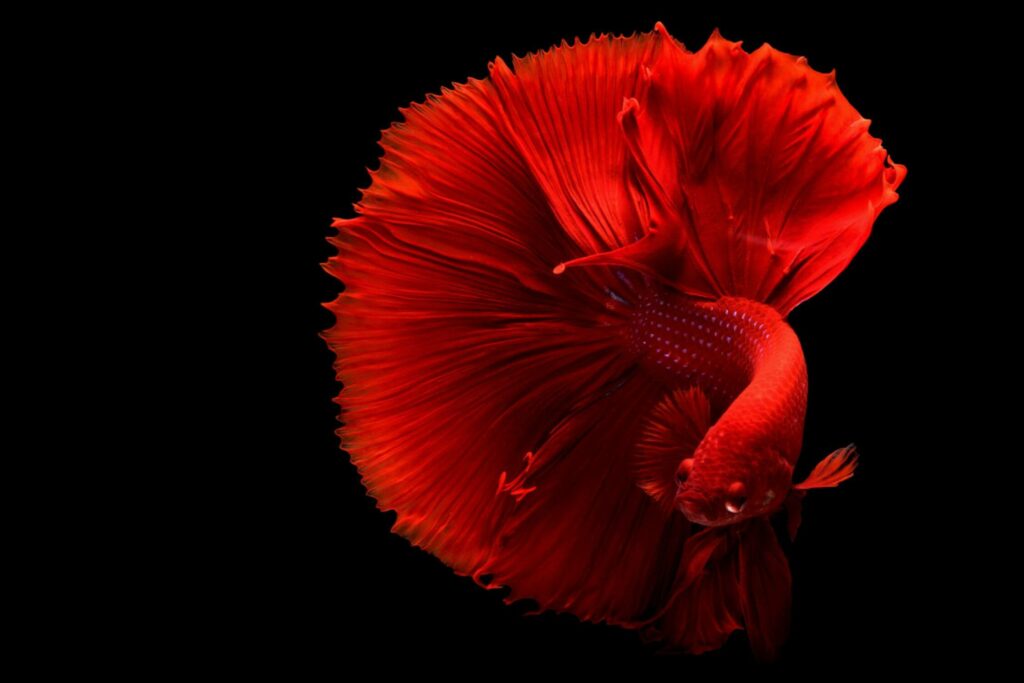The natural habitat of betta fish is in the far-off coastal waters in Cambodia, Vietnam, and Thailand, where they thrive and live comfortably.
But many people breed this beautiful fish, sometimes known as the Siamese fighting fish, for people to bring home and keep as pets.
Betta fish have long been sold as an “easy-to-take-care-of” pet, which is somewhat true.
While betta fish don’t require as much attention as something like a dog, they require unique care. Without the right care, your betta fish might unfortunately die.
Have you experienced something similar? Did your betta fish die suddenly? If you are still unsure what led to the fish’s death, this guide will help you understand. Continue reading this article till the end to find your answer to the question, “why did my betta fish die suddenly?”
Reasons your betta fish died: most common causes

Here is a list of causes why your tropical fish might have died. Make sure to take note of these so that if you get betta fish for your aquarium again, it does not have to go through something similar.
Inadequate water conditions

Betta fish are not difficult to take care of. They require very minimal maintenance, but you need to make sure you do the maintenance properly. One of the common reasons betta fish die is poor water quality.
The tank should have enough space (minimum 10-gallon for one betta fish), beneficial bacteria, and an adequate water temperature. For instance, bettas need warm water, the temperature varying from 75 degrees F to 80 degrees F.
Adding beneficial bacteria into the aquarium water is called the nitrogen cycle and is something you might find useful to get your tank up to snub before adding your betta fish into it. While it’s not neccsary, if you’re finding that you struggle to keep your betta fish alive, you might want to consider trying a nitrogen cycle.
The nitrogen cycle may take up to six weeks (or longer) to complete. It ensures that all the toxic substances like nitrate and ammonia are turned into non-toxic nitrate. This must be done prior to adding fish into the tank.
The water parameters should be at 0ppm nitrate and ammonia; otherwise, there will be toxin build-up in the aquarium water. Betta fish die easily when there’s a build-up of nitrate and ammonia, and nitrogen cycles are the perfect solution.
Changing aquarium water is another factor causing betta fish die. You might think that you need to provide your fish with 100% clean water every time you change water; however, that’s not the case.
You only need to change 30% to 50% of the aquarium’s water every time you clean it. Save the rest of the water in a clean bucket and add it back in before adding your fish. 100% new water will shock your fish and could lead to death. While cleaning, you should also make sure to clean and vacuum the bottom of the fish tanks to prevent algae growth ammonia poisoning from the rocks.
Overfeeding
Betta fish die easily when overfed. Bettas are carnivorous fish, and they love feeding on freeze-dried bloodworms, betta pellets, etc. Most often, feeding also becomes a part of bonding with your fish and your fish will swim excitedly when you come to their tank (as they know you’ll have food).
Often, people love seeing the enthusiasm from their betta fish when it’s feeding time and will begin feeding them more and more. Which can turn into a deadly combo, as betta fish love eating and won’t stop, even if they’re incredibly full.
But bettas have small stomachs, which are only about the size of its eyeball; hence they don’t require much food. You should feed them once to twice a day only and only two to four pellets per feeding. Overfeeding can lead to gastrointestinal issues which can cause your betta fish to slowly die.
Another drawback of giving excessive food is that the uneaten food particles can accumulate in the tank over time, which again spoils the water quality and ruins the water parameters you’ve worked so hard to maintain. Signs your water tank is clogged with excessive fish food are milky water, fungi or mold, and algae bloom.
Improper fish tank
Unfortunately, we can blame pet stores for this. Many pet stores keep betta fish in inhumanely small containers, displayed on their shelves. As such, people assume that betta fish don’t need much room to swim, and decide to keep them in a small vase or fish bowl when they get home.
Betta fishes are a tropical fish, and they’re used to live in the wild waters. Dumping bettas in a small vase or bowl and expecting it to adjust is one of the worst things you can do.
Bettas can’t adjust in small water tanks, which also limits their activity. Moreover, the toxin build-up is easy in narrow water sources, which ultimately leads to your betta fish dying. Confining your betta fish to a small bowl or vase leads to a buildup of toxins, which will harm your betta fish.
For one betta fish, the minimum tank size is 10-gallons.
Aggressive tankmates

Other fish and aggressive tank mates are often the culprit of a dead betta fish. If your aquarium is not large enough and does not offer enough hiding space to the bettas, they can get aggressive.
Besides, if you keep your bettas with other aggressive fish like tiger barbs, violence among tank mates can result in betta fish death.
Stress levels
Betta fish can adjust better in an isolated environment. They are bubble nesting fish that make their own nest in shady waters. Having less space in the tank is one of the reasons your betta fish might get stressed.
Additionally, having too many species with the bettas in the water may also increase stress levels. Therefore, try not to keep your fish in an overcrowded tank as this fish enjoys its lone and peaceful time.
Betta fish also can’t adjust if the water flow is too high. These wild fish prefer calm waters with no violent tank mates and enough hiding space. Constant stress is one of the primary reasons for a betta fish dying suddenly.
Accidental injuries
Even though betta fish can quickly adapt to a suitable aquarium environment, it is a delicate fish. The fish’s body is pretty fragile, with long flowing fins which are very injury prone. If you have kept any sharp objects in the aquarium (like pointy plastic plants) which can catch the betta’s fins, you may end up with a dead fish.
Apart from these objects, injuries are quite common if you are keeping them in a community tank. Betta fish will engage in aggressive actions with other fish, ultimately leading to an injured betta. The best way to ensure you have a healthy fish is by housing it alone without many betta fish in the same tank.
Old age
Most betta fish have a lifespan of two to five years. If your fish has been living with you for some time and you suddenly notice it slowing down, it could mean your betta fish is dying (of natural causes). If old age is the reason, you will see certain common symptoms. They are as follows:
White dot
When the betta fish gets old, you will notice white dots appearing in some parts of their head. These stays for some time, disappear, and then reappear in other parts of their head. This differs from ich which will cause multiple white dots on your fish.
Change in behavior
When your tank fish gets older, they will be less active. The wiggle dance you might have seen while communicating with the fish will no longer be there, and they will appear less aggressive.
Fading body color
Betta fish is known for its beautiful iridescent bluish-green body color, but as they age, this color fades. It’s not that your fish will completely lose its color, but it will look much pale than a young betta. You may notice the fish turning more brownish-yellow than bluish-green.
Deteriorating fins
As the betta gets old, its fins rot and lose their actual color and charm, and the ends might start to curl.
Lost appetite
Lost appetite is another common symptom of why betta fish die. With age, their appetite decreases, and they don’t need as much food as they did earlier.
Lethargic
Bettas are generally very active fish, and they love to interact with their owners. But an old betta will spend most of its time laying at the tank bottom.
Disease
Diseases are very common for aquarium fish. They may enter the tank while changing waters, tank cleaning, using the same equipment for different tanks, putting dirty hands insides, and sometimes through aquarium plants resulting in sick fish.
Although there are medications available for different diseases, sometimes you can’t revive the fish’s health resulting in sudden death.
Bad genetics
Most betta fish die because of bad genetics as well. When you buy a fish from the local pet store, you are not aware of its breeding. Most breeding farms focus more on quantity which decreases their life to half.
Swim bladder disease or swim bladder disorder is quite common in poorly bred bettas fish, leading to the death of betta fish. One common sign of swim bladder disease is if you’re betta fish is struggling to float properly. They might sink to the bottom or float to the top,
Excessive medication
Being careless with the medication can cause betta fish death. Some medications have side effects that you may not be aware of and can be very harmful. Hence, always read the prescribed dosage according to the size of your glass aquariums.
Giving extra dosage accidentally can suffocate the fish, ultimately causing the bettas to die.
Chlorine burn
Water needs to be dechlorinated before keeping the betta fish in the aquarium’s water. All tap, bottled, and reverse osmosis need to be dechlorinated. If you don’t do this process, you will notice black patches on the fish’s body which is actually chlorine burn.
Cool water
Bettas are used to living in warmer waters; therefore, you must accommodate a heater inside to keep the water temperature ideal. Not all aquarium owners know such conditions of the fish, and ultimately the bettas die due to cool waters.
Signs your betta fish is dying

Here are some common symptoms you can notice in a dying betta fish:
- The fish spends most of its time resting at the tank bottom.
- If the betta fish is suffering from swim bladder disorder, it will float unnaturally and have buoyancy issues. If this disease goes untreated, the betta fish will die.
- Your fish will lose its appetite if it’s sick, which is again a sign of dying betta fish.
- Change in the body color should be your matter of concern as it means your betta fish may die anytime soon.
- Betta fish that are not healthy will always try to hide.
Can I save my betta fish from dying?
Yes, you can save your betta fish from dying if you notice the changes early on. If the fish has any injury, you can heal it with proper medication. For an illness like swim bladder disease, you can help you fish by not giving it food for three days.
Remember: ensuring good health for the betta mostly depends upon maintaining a good aquarium environment, allowing enough space for the fish, monitoring its diet, and keeping it away from other aggressive fish.
Wrapping up
Do betta fish die easily? The answer is no; they don’t. However, this fish is quite fragile and survives only in adequate conditions.
If you didn’t have a very pleasant experience with your betta fish previously, try noting down the causes of its death. Next time you get this exotic fish for your aquarium, take proper care, and your fish will thrive.
FAQs
Common conditions for your betta fish may die: cold water, poor tank water conditions, injury, stress, and overeating.
You should only change about 10% to 20% of aquarium water; if you change the entire water, your betta fish may die.
Betta fish do not necessarily float when they die. Most of the time, a dead betta fish is found lying at the tank bottom or in their hiding spot. So a floating betta fish isn’t always dead.

